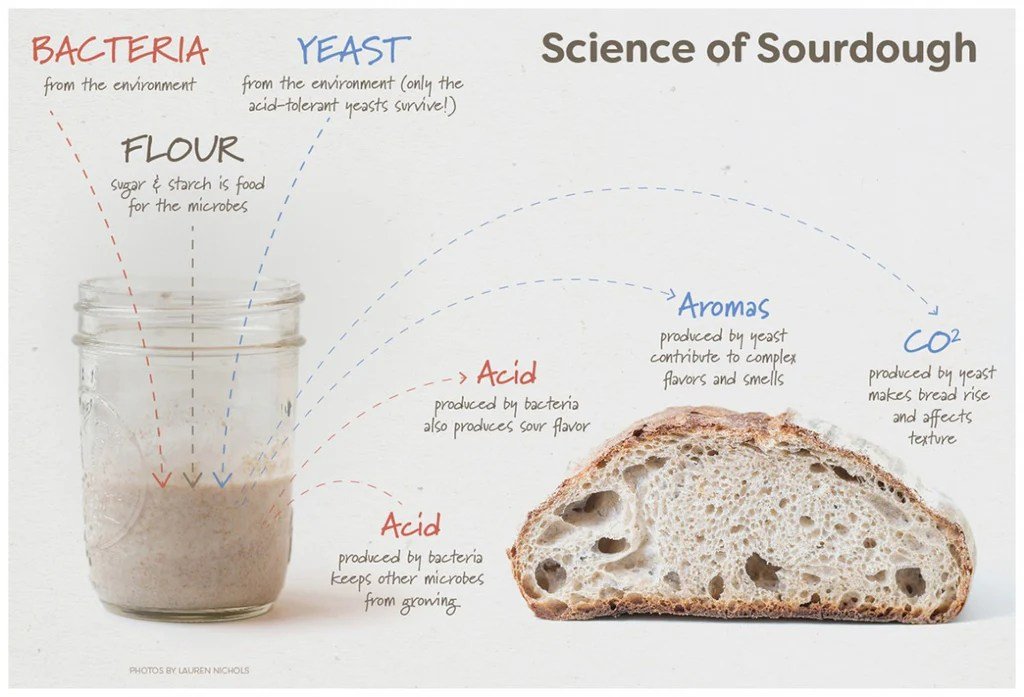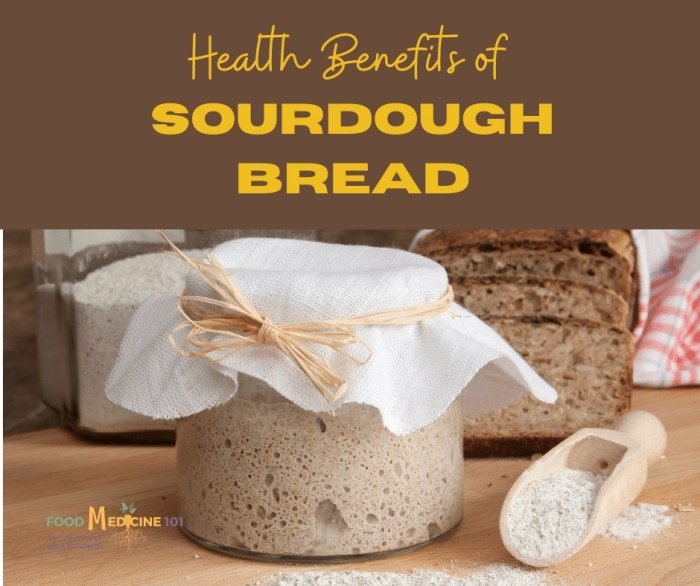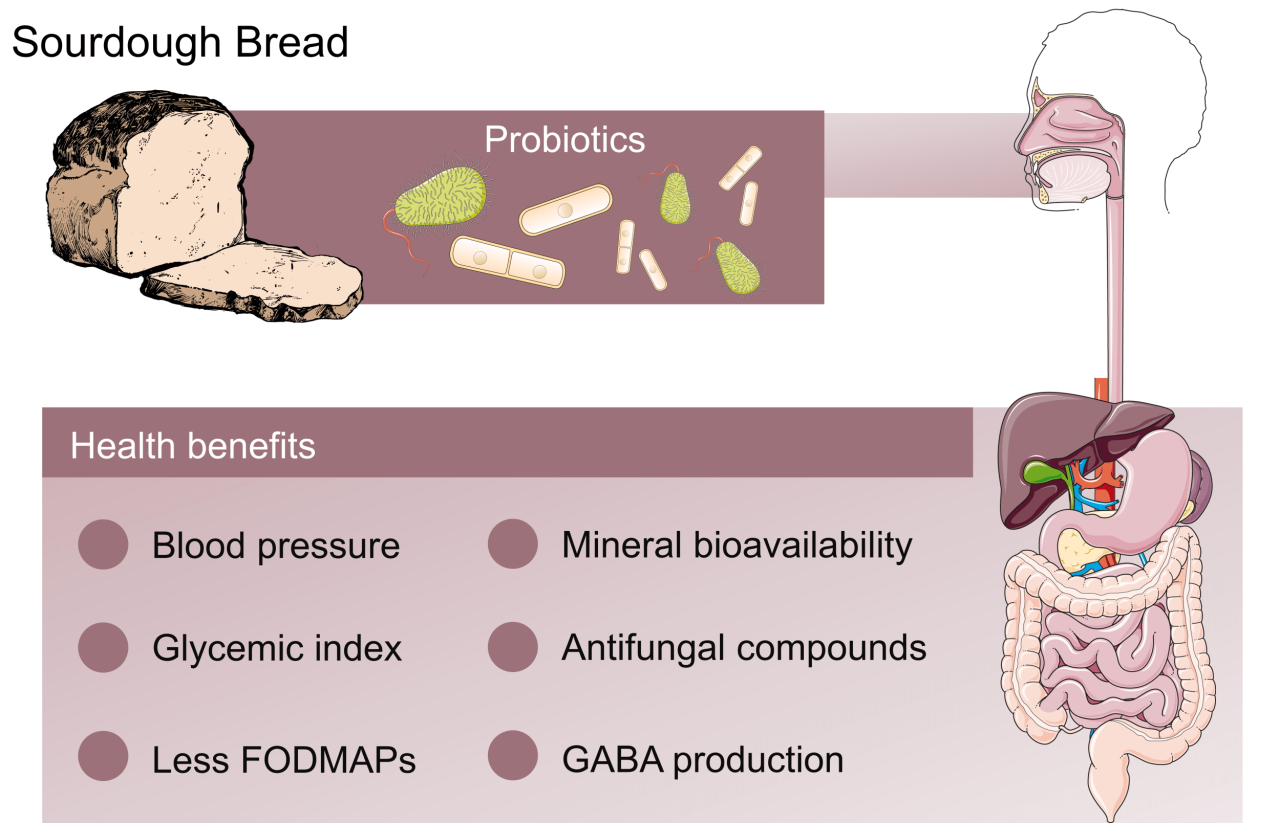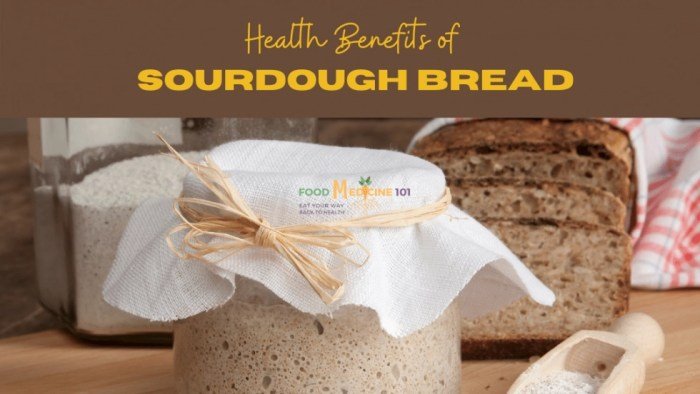Health benefit of sourdough bread – The health benefits of sourdough bread have taken center stage in recent years, with many people seeking out this unique and flavorful bread for its potential health advantages. Sourdough bread, crafted using a traditional method involving wild yeast and bacteria, offers a distinct taste and texture compared to commercially produced bread.
The fermentation process involved in sourdough bread making is believed to unlock a range of potential health benefits, impacting digestion, blood sugar levels, and even heart health.
This article delves into the science behind sourdough bread, exploring its nutritional profile, digestive benefits, and potential impact on various health markers. We’ll uncover the reasons why sourdough bread has gained popularity among health-conscious individuals and explore the growing body of research supporting its potential health benefits.
Sourdough Bread: Health Benefit Of Sourdough Bread

Sourdough bread is a type of bread that has been around for centuries. It is made using a unique process that involves the fermentation of a mixture of flour and water, using wild yeast and bacteria. This process gives sourdough bread its characteristic tangy flavor, chewy texture, and numerous health benefits.
Sourdough Bread: A Unique Baking Process
Sourdough bread is a unique type of bread that is made using a starter, which is a mixture of flour and water that has been allowed to ferment with wild yeast and bacteria. The starter is the key ingredient in sourdough bread, and it gives the bread its distinctive flavor and texture.The process of making sourdough bread starts with creating a sourdough starter.
This involves combining flour and water in a container and allowing it to sit at room temperature for several days. During this time, wild yeast and bacteria present in the air will begin to ferment the mixture. The starter will become bubbly and have a slightly sour smell.
Once the starter is active, it can be used to make sourdough bread.To make sourdough bread, you will need to combine the starter with flour, water, and salt. The dough is then kneaded and allowed to rise for several hours.
The starter helps the dough rise by producing carbon dioxide gas, which creates air pockets in the bread.Sourdough bread is baked in a hot oven, which helps to develop the crust and create a chewy texture.
Benefits of Using a Sourdough Starter
Sourdough starters offer several advantages over commercially produced yeast. They can:
- Enhance Flavor: The fermentation process in sourdough starters produces a complex array of organic acids, including lactic acid and acetic acid, which give the bread its distinctive tangy flavor.
- Improve Texture: Sourdough starters contribute to a more chewy and elastic texture in the bread. The fermentation process breaks down gluten, resulting in a softer and more digestible bread.
- Boost Nutritional Value: The fermentation process in sourdough bread can increase the availability of certain nutrients, such as iron and zinc. Additionally, the lactic acid produced during fermentation can help to break down phytates, which are compounds that can hinder the absorption of minerals.
Comparison to Conventional Bread Making
Sourdough bread making differs significantly from conventional bread making in terms of ingredients and techniques:
- Ingredients: Conventional bread making typically relies on commercially produced yeast, while sourdough bread uses a starter made from wild yeast and bacteria. Sourdough bread often uses less sugar than conventional bread, as the fermentation process provides sweetness.
- Techniques: Sourdough bread making requires more time and attention than conventional bread making. The sourdough starter needs to be maintained and fed regularly, and the dough requires a longer fermentation time. The kneading process for sourdough bread is also different, as the dough is typically kneaded for a shorter period.
Nutritional Profile of Sourdough Bread

Sourdough bread, a staple in many cultures, is known for its unique flavor and texture. However, beyond its culinary appeal, sourdough bread boasts a nutritional profile that sets it apart from other types of bread. This section delves into the macronutrients and micronutrients present in sourdough bread, comparing its nutritional value to white and whole wheat bread, and highlighting the potential health benefits associated with its unique composition.
Macronutrient Composition
Sourdough bread, like other types of bread, is primarily composed of carbohydrates, with a moderate amount of protein and a relatively low fat content. However, the specific macronutrient breakdown can vary depending on the ingredients used and the baking process.
- Carbohydrates:Sourdough bread is a good source of carbohydrates, providing energy for the body. The carbohydrates in sourdough bread are primarily complex carbohydrates, which are digested slowly and provide sustained energy release.
- Protein:Sourdough bread contains a moderate amount of protein, contributing to muscle building and repair. The protein content can vary depending on the flour used and the amount of starter added.
- Fat:Sourdough bread is generally low in fat, with most of the fat coming from the flour and any added oils. The fat content can vary depending on the recipe and the type of oil used.
Micronutrient Content, Health benefit of sourdough bread
Sourdough bread is a good source of several essential micronutrients, including vitamins, minerals, and antioxidants. These nutrients play vital roles in maintaining overall health and well-being.
- Fiber:Sourdough bread is a good source of dietary fiber, which is essential for digestive health. The fermentation process used to make sourdough bread increases the fiber content compared to other types of bread.
- Iron:Sourdough bread is a good source of iron, a mineral that plays a crucial role in red blood cell production and oxygen transport throughout the body.
- Potassium:Sourdough bread is a good source of potassium, an essential mineral that helps regulate blood pressure and muscle function.
- B Vitamins:Sourdough bread is a good source of B vitamins, which are essential for energy production, cell growth, and brain function.
Comparison to Other Bread Types
| Nutrient | Sourdough Bread | White Bread | Whole Wheat Bread |
|---|---|---|---|
| Carbohydrates | High | High | High |
| Protein | Moderate | Low | Moderate |
| Fat | Low | Low | Low |
| Fiber | High | Low | High |
| Iron | Good Source | Low | Good Source |
| Potassium | Good Source | Low | Good Source |
Potential Health Benefits
Sourdough bread’s unique nutritional profile, particularly its high fiber content, may offer several potential health benefits.
Sourdough bread, with its naturally occurring beneficial bacteria, can aid in digestion and even promote gut health. For those seeking further medical guidance on the benefits of a healthy diet, prisma health greer memorial hospital is a great resource in the Greer, South Carolina area.
Incorporating sourdough bread as part of a balanced diet can be a delicious and nutritious choice, supporting overall well-being.
- Improved Digestion:The high fiber content in sourdough bread can help promote regular bowel movements and prevent constipation. Fiber also acts as a prebiotic, feeding the beneficial bacteria in the gut, which can improve overall gut health.
- Blood Sugar Control:The slow release of carbohydrates from sourdough bread can help stabilize blood sugar levels, which is particularly beneficial for individuals with diabetes or those seeking to manage their blood sugar levels.
- Heart Health:The fiber and potassium in sourdough bread may contribute to heart health by lowering cholesterol levels and reducing blood pressure.
Sourdough Bread and Digestive Health

Sourdough bread has gained popularity in recent years, not only for its unique flavor but also for its potential digestive benefits. The traditional fermentation process involved in sourdough bread production, using a starter culture of wild yeast and lactic acid bacteria, may offer advantages over other bread types.
The Role of Prebiotics and Probiotics
The fermentation process in sourdough bread production results in the presence of both prebiotics and probiotics, which play crucial roles in gut health.
- Prebioticsare non-digestible fibers that act as food for beneficial bacteria in the gut, promoting their growth and activity. Sourdough bread contains prebiotics, such as inulin and resistant starch, which are not broken down by the digestive system but are fermented by gut bacteria.
- Probioticsare live microorganisms that provide health benefits when consumed in adequate amounts. Sourdough starter cultures contain various lactic acid bacteria, which are considered probiotics. These bacteria contribute to the unique flavor and texture of sourdough bread while also potentially improving gut health.
Sourdough bread, with its slow fermentation process, boasts numerous health benefits. It’s easier to digest than regular bread and may even aid in weight management. But beyond its internal benefits, sourdough bread can also contribute to a radiant exterior. For inspiration on how to enhance your natural beauty, check out beautiful lines for her beauty.
Ultimately, a healthy diet, including sourdough bread, can contribute to a healthy glow, making you feel both inside and out.
The Impact of Fermentation on Gluten Digestibility
Sourdough bread may be easier to digest for some individuals, particularly those with gluten sensitivity or celiac disease. This is because the fermentation process breaks down gluten proteins, making them less likely to trigger an immune response.
- During fermentation, the lactic acid bacteria in the sourdough starter produce enzymes that partially break down gluten proteins. This process can alter the structure of gluten, making it less likely to trigger an immune response in individuals with gluten sensitivity.
- While sourdough bread may be easier to digest for some individuals with gluten sensitivity, it’s important to note that it does not eliminate gluten entirely. Individuals with celiac disease should still avoid sourdough bread as it contains gluten.
Sourdough Bread vs. Other Bread Types
Compared to other bread types, sourdough bread may be associated with fewer digestive discomforts like bloating and gas. This is attributed to the prebiotics and probiotics present in sourdough bread, which contribute to a healthier gut microbiome.
- The fermentation process in sourdough bread production leads to the breakdown of complex carbohydrates, making them easier to digest and potentially reducing the risk of bloating and gas. This is in contrast to other bread types, which may contain more complex carbohydrates that are not fully broken down during digestion.
- The presence of probiotics in sourdough bread may help balance the gut microbiome, promoting healthy digestion and reducing the likelihood of digestive discomfort. This is in contrast to other bread types, which may not contain probiotics and could potentially contribute to an imbalance in the gut microbiome.
Sourdough Bread and Blood Sugar Control

Sourdough bread, with its unique fermentation process, has garnered attention for its potential impact on blood sugar levels. While traditional white bread often causes rapid spikes in blood sugar, sourdough bread has shown promise in promoting a more gradual and controlled rise in blood glucose.
This difference in blood sugar response is linked to the specific composition and properties of sourdough bread, which are influenced by the fermentation process.
The Role of the Glycemic Index (GI)
The glycemic index (GI) is a valuable tool for understanding how different foods affect blood sugar levels. The GI measures how quickly a food raises blood glucose levels compared to pure glucose. Foods with a high GI are digested and absorbed rapidly, leading to a sharp rise in blood sugar.
Sourdough bread is known for its gut-friendly benefits, thanks to the beneficial bacteria that thrive during fermentation. This process also helps break down complex carbohydrates, making the bread easier to digest. While enjoying a slice of sourdough, why not incorporate some physical activity into your routine?
Check out torque fitness for a variety of strength training equipment that can help you build muscle and improve your overall health. After all, a balanced lifestyle that includes both healthy eating and exercise is the key to feeling your best.
In contrast, foods with a low GI are digested more slowly, resulting in a gentler and more gradual increase in blood sugar.
The GI is a scale from 0 to 100, with higher numbers indicating a faster rise in blood sugar.
The GI of bread can vary significantly depending on its ingredients and processing methods. White bread, made from refined flour, typically has a high GI, while whole-grain bread tends to have a lower GI.
Sourdough Bread and Blood Sugar Control: Research Findings
Studies have explored the impact of sourdough bread on blood sugar levels, and the findings suggest that sourdough bread may offer benefits for blood sugar management, particularly for individuals with diabetes.
- One study published in the -Journal of the American College of Nutrition* found that sourdough bread had a lower GI than white bread, suggesting a slower rise in blood sugar after consuming sourdough bread.
- Another study, published in the -European Journal of Clinical Nutrition*, observed that sourdough bread had a lower postprandial glucose response (the rise in blood sugar after a meal) compared to white bread, indicating a more controlled blood sugar response.
- Furthermore, research has shown that the fermentation process in sourdough bread breaks down some of the complex carbohydrates, making them easier to digest and reducing the overall glycemic load.
These studies provide evidence that sourdough bread may be a valuable addition to a healthy diet, particularly for individuals managing blood sugar levels. It’s important to note that while sourdough bread may offer benefits for blood sugar control, it’s not a cure for diabetes and should be consumed as part of a balanced diet and lifestyle.
Sourdough Bread and Heart Health

Sourdough bread, with its unique fermentation process, might offer potential benefits for heart health. This is primarily attributed to its high fiber content and its impact on cholesterol levels.
Sourdough Bread and Fiber
Dietary fiber is essential for heart health. It helps lower cholesterol levels, improves blood sugar control, and promotes healthy digestion. Sourdough bread, due to its fermentation process, is richer in fiber compared to commercially produced white bread.
- The longer fermentation time allows for the breakdown of complex carbohydrates into simpler sugars, making the bread easier to digest.
- This process also increases the bread’s fiber content, contributing to its heart-healthy benefits.
Sourdough Bread and Cholesterol
High cholesterol levels are a major risk factor for heart disease. Sourdough bread, with its higher fiber content, may help lower cholesterol levels.
- Fiber binds to cholesterol in the digestive tract, preventing its absorption into the bloodstream.
- This can help reduce both LDL (“bad”) cholesterol and total cholesterol levels, contributing to a healthier heart.
Sourdough Bread Compared to Other Breads
While sourdough bread offers potential benefits for heart health, it’s important to compare it to other types of bread.
- White bread, often made with refined grains, is lower in fiber and can contribute to higher blood sugar levels, potentially increasing the risk of heart disease.
- Whole-grain bread, while generally healthier than white bread, may not have the same level of fiber as sourdough bread.
Incorporating Sourdough Bread into a Heart-Healthy Diet
To reap the heart-healthy benefits of sourdough bread, it’s important to incorporate it into a balanced diet that includes:
- Plenty of fruits and vegetables
- Lean protein sources
- Healthy fats like those found in olive oil and avocados
- Regular physical activity
Sourdough Bread and Other Potential Health Benefits

Beyond its digestive benefits, sourdough bread might offer additional health advantages. Emerging research suggests that sourdough bread may possess antioxidant properties and could play a role in reducing inflammation.
Antioxidant Properties
Sourdough bread’s fermentation process can enhance its antioxidant properties. This is due to the production of various beneficial compounds, including phenolic acids and flavonoids. These antioxidants help protect cells from damage caused by free radicals, which are unstable molecules that can contribute to aging and chronic diseases.
- One study published in the Journal of Agricultural and Food Chemistry found that sourdough bread contained significantly higher levels of phenolic acids compared to commercially produced white bread.
- Another study published in the International Journal of Food Science and Technology revealed that sourdough bread exhibited stronger antioxidant activity than regular bread.
Anti-Inflammatory Effects
Sourdough bread’s fermentation process can also lead to the production of short-chain fatty acids (SCFAs), such as butyrate. SCFAs are known to possess anti-inflammatory properties and have been linked to a reduced risk of chronic inflammatory diseases.
- Butyrate, in particular, has been shown to modulate immune responses and reduce inflammation in the gut.
- Studies suggest that a diet rich in SCFAs, such as those found in sourdough bread, may contribute to a healthier inflammatory profile.
Emerging Research
Further research is ongoing to explore the potential health benefits of sourdough bread.
- Some studies suggest that sourdough bread may have a positive impact on blood pressure and cholesterol levels.
- Others are investigating its potential role in improving gut microbiome diversity and overall gut health.
Last Point
Sourdough bread stands out as a unique and potentially beneficial option for those seeking a healthier bread choice. While further research is needed to fully understand its long-term health effects, the evidence suggests that sourdough bread may offer several advantages over other bread types.
From its prebiotic and probiotic properties to its potential impact on blood sugar levels and heart health, sourdough bread offers a compelling alternative for individuals looking to improve their dietary choices. By understanding the science behind sourdough bread, you can make informed decisions about incorporating it into your own diet and reaping its potential benefits.
Common Queries
Is sourdough bread really healthier than other types of bread?
While sourdough bread may offer some potential health benefits, it’s essential to remember that all bread contains carbohydrates and should be consumed in moderation as part of a balanced diet. The health benefits of sourdough bread may be more pronounced compared to commercially produced white bread, but it’s not a magic bullet for a healthy lifestyle.
Can sourdough bread help with weight loss?
Sourdough bread may help with weight management by promoting a feeling of fullness due to its higher fiber content. However, its calorie content is similar to other types of bread, so it’s crucial to consume it in moderation as part of a balanced diet and exercise plan.
Is sourdough bread suitable for people with gluten intolerance?
While the fermentation process in sourdough bread may break down some gluten, it’s not a guaranteed solution for individuals with celiac disease or severe gluten sensitivity. People with gluten intolerance should always consult with a healthcare professional or registered dietitian to determine the best dietary approach for their needs.